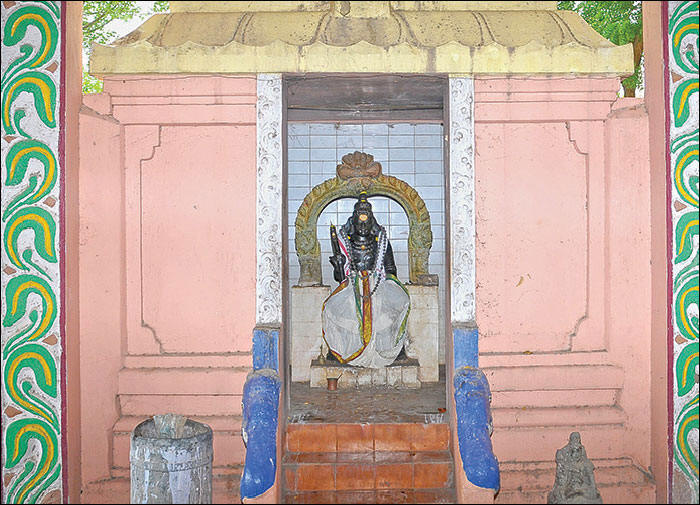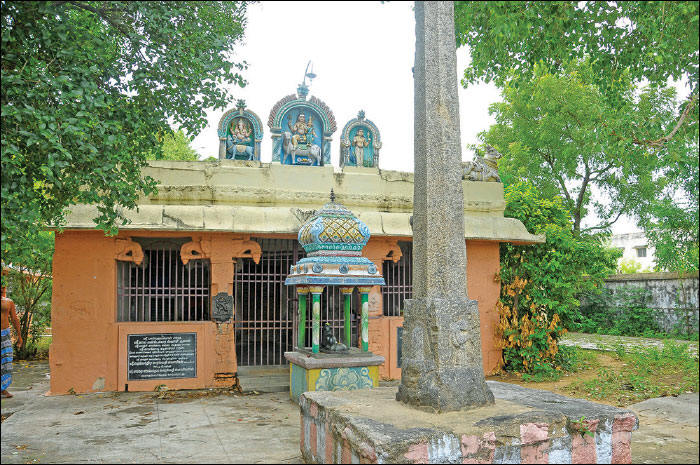சக்தி விகடன் - 09 Oct, 2018
Posted Date : 06:00 (Sep /25/2018)
திருவருள் செல்வர்கள்! - 12
ஸ்ரீஅப்பய்ய தீட்சிதர்
பி.என்.பரசுராமன் Author: P.N. Parasuraman
Murali K
செல்வர்கள்! - 12 - ஸ்ரீஅப்பய்ய தீட்சிதர்
Staretsy! - 12 - SriAyyappa Dikshithar
That Mahāṉ (Starets) was a wonderful man. He does not think of doing harm to others even in his mind. At all times his thoughts rested in Siva. He was an accomplished performer of ritual fire sacrifices. Because he performed the fire sacrifices (வேள்வி), the place received a name ‘Vēḷvic Chēri’ (= வேள்விச் சேரி =Sacrificial Hamlet). Now the name has a corrupted spelling Vēḷacchēri (‘வேளச்சேரி’ = Vēḷacchēri). (This mutant word Vēḷacchēri is easy on the tongue and enunciation.) 1
That man of God had a thought, “Do we chant God’s name with divine thought? Do we utter God’s names with spiritual fervor, by rote or mechanically? I should subject them to tests.” 2
A thought flashed in his mind. The children and the insane tell their thoughts as they appear. The Mahāṉ planned to test the Insanity Hypothesis, whether we engage in the recitation of God’s name while in the state of insanity. He wanted to go insane by ingesting a paste of ‘Ūmaththaṅkāi (=Ūmaththam+Kāi = ஊமத்தங்காய் = Fruit of thorn-apple). He kept a prepared paste of the thorn-apple ready for use. 3
He prepared an antidote to counter the poison. 4
Why did he make the antidote? 5

Kanchi Mahāswāmigaḷ explains this wonderfully. “If a person does not recite God’s name in a state of insanity, the present birth will go to waste. By recovering the sanity again, the person recites God’s name because he wants to reach the shore of liberation. 6
Keeping the poison and the antidote by his side, he called his disciples and told them, “Write down everything that I say in the state of insanity, induced by the thorn apple paste and then give me the antidote.” 7
It happened. Insanity gripped him tight. He lost his mind. The disciples took notes of every word and syllable he said. Later, the disciples administered the antidote, and the Mahāṉ was back to his sane state of mind. 8
The disciples crossed the t’s and dotted the I’s of all that he said in their writing. They were all wonderful poems of eulogy of Siva worship. Those poems were the famous and popular ‘Ātmārppaṇa Stuti’ and Uṉmaththa Paṅchāsat.’ Singing those songs on Haran, without self-awareness, that Mahāṉ is none other than SrīAppaiya. 9
“Virtuous people are susceptible to danger. The truly great and virtuous people face danger.” This is a Tamil proverb. Dīkṣathar is not an exception, immune to danger. Good people tried to kill him. 10

How did he escape from the killers? Follow me! Let us consider some events in his life. Srīdīkṣithar took his birth in Adaiyapalam near Vellore in Tamil Nadu in the latter half of the 16th century. He was regarded as the partial Amsa Avatara of Siva as was Sankaracharya. He was the son of Śrīraṅga Rājāthvari the titled Advaita Vidyāchāriyār. Their ancestors had Viringipuram Srīmārga Bhanthīśvarar as their Kula Deivam and Chidambara Srīkanakasabēsvarar as the IṣtaDevata. 13
He learned Vedas at a tender age and shined as the great Siva Baktha. As a youth, he married Maṅgaḷāmbikai, the daughter of Kanchi Srīnivāsa Dīkṣathar. 14
Vada Ārcot division was under the rule of Chinna Bhomman. In his court, Srīdīkṣithar and Thāthāsāriyār were the resident Vidvāṉs. Srīdīkṣithar never entertained sectarian affiliation and treated everyone equally. His excellent behavior attracted the attention of the king, who was close, loving and respectful with Srīdīkṣithar. The other Vidvān could not brook his popularity with the king and caused a lot of trouble. Srīdīkṣithar because of the grace of Siva, was victorious in all matters. 15
Once, at the command of the Tanjore king (Narasimha Būpālaṉ according to a treatise), Dikshithar conducted a fire sacrifice in Kālahaṣthi. 16

Tanjore king and Vellore king were present for the fire sacrifice. Srīdīkṣithar completed the sacrifice according to the established tradition. The jealous Vidvān told the kings that the Dīkṣithar cast and destroyed all the royal rewards in the fire. He submitted a complaint in writing. The kings came to Srīdīkṣithar and knowing the charge, he prayed to the fire-god, “O Agni Bhagavan! Please show me the golden articles, the devotees gave me, which I gave you with my heart and soul. That moment, Agni Bhagavan manifested himself and showed all the silk and gold offerings he received. The complaining Vidvān with downcast head offered homage along with the kings and took leave of the Srīdīkṣithar. 17
On another occasion, king Chinnabomman took Srīdīkṣithar, and a Vidvān from his court went to see the Tanjore king. The foursome went for temple worship. 18
An idol of a village deity had its index finger resting on its nose. Asked about the reason, the answer coming from the temple official was, “A Mahāṉ will reveal the secret of the idol, and the Sāsthā (the deity) will remove his finger from his nose.” 19
The kings looking at Srīdīkṣithar and the Vidvān asked, “Can one of you reveal the idol’s secret?” 20
The Vidvān came forward and said, “Sāsthā’s Vigraha (idol) is thinking, since he is the son of Mahavishnu, equal to Brahma, he regrets his misfortune of associating with Siva’s Bhuta Gaṇas (attendants). 21
When Dīkṣithar gave an explanation, a wondrous event took place! Do you know his explanation? 22
The Divine Grace will flourish.
The Wordsmith with the golden tongue, P.N. Parasuraman.
Images: K. Murali
255-228-225